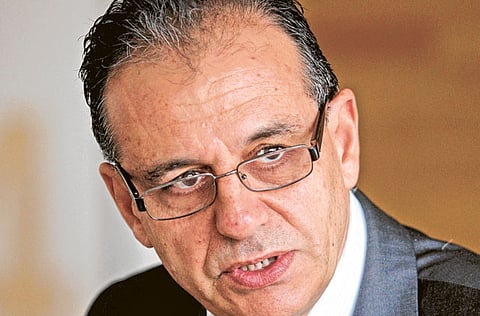Economy, banking benefit from turmoil
UAE to have 7.6% fiscal surplus this year

Dubai: The current political upheaval in the region is benefiting the UAE economy and banking system because of some diversion of capital from troubled countries, Dr Garbis Iradian, deputy director of the Institute of International Finance (IIF), told Gulf News yesterday.
"Total bank deposits including resident, non-resident and government deposits have risen significantly in recent months, by 14.3 per cent in the year up to March 2011," said Dr Iradian.
"More than half of the increase was in time and savings deposits in local and foreign currencies. In our view, this increase in longer-term deposits reflects improved confidence in the UAE economy."
According to the IIF, the turmoil in the Arab world could indirectly boost the UAE's economy through channels such as higher production of crude oil; larger revenues due to a spike in oil prices; and a diversion the regional trade, transportation, tourism and finance.
The IIF estimates that Dubai's economy is expected to recover significantly, growing by 3.5 per cent in 2011 compared to 1.7 per cent in 2010.
Credit growth
Dr Iradian expects credit growth in the UAE to improve gradually in 2011 and 2012, supported by strong growth in deposits, improvement in liquidity of banks, and a pickup in domestic demand.
"The UAE banks remain well capitalised and profitable. Provisions now cover more than 95 per cent of non-performing loans. The liquidity of the banking system has also improved as indicated by the steady decline in the loan-to-deposit ratio, from 108 per cent at end-2008 to 95 per cent at end-March 2011," said Dr Iradian.
The IIF official observed that Dubai has regained market access, but the cost of borrowing remains high, reflecting the rollover needs of the total of $31 billion falling due in 2011- 12, and concerns about the solvency of restructured government related entities.
The UAE's current account was in a surplus of $22 billion or 8.6 per cent of GDP in 2010 due to an increase in oil exports resulting from higher oil prices and a modest increase in production.
With oil prices projected to average around $115 per barrel in 2011, the UAE's current account surplus is expected to jump to $43 billion.
The IIF estimates showed a small fiscal deficit of 1 per cent of GDP in 2010 compared to a large deficit of 10.5 per cent of GDP in 2009. This improvement in fiscal performance is largely attributed to the sharp increase in Abu Dhabi's oil revenues.
"For 2011, we forecast a consolidated fiscal surplus of 7.6 per cent of GDP despite the projected small deficits of the federal government and Dubai's budgets for 2011," he said.
The surplus is due to the large increase in Abu Dhabi's oil revenues, which are expected to more than offset a projected increase of 8 per cent in consolidated spending.
The total external debt of the UAE in 2010 is estimated at $157 billion, of which about $90 billion is owed by Dubai.
Dubai's total debt is estimated at $120 billion including domestic debt vis-à-vis local banks.
While the UAE's total foreign assets are estimated at $449 billion at end-2010, the country has an estimated net external asset position of $292 billion, equivalent to 116 per cent of 2010 GDP.



